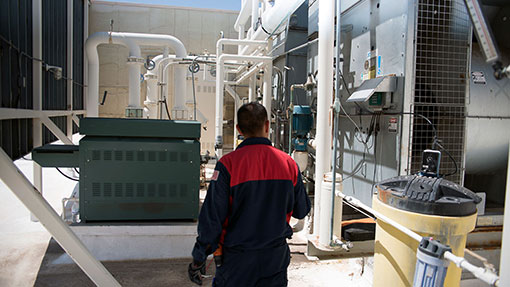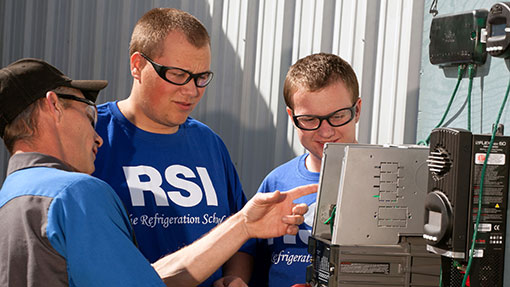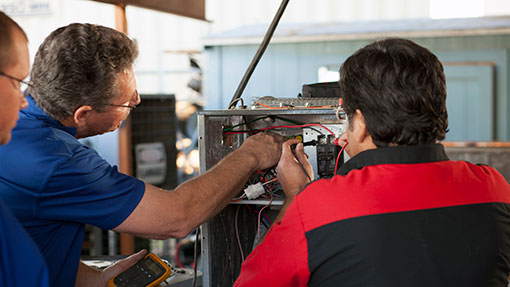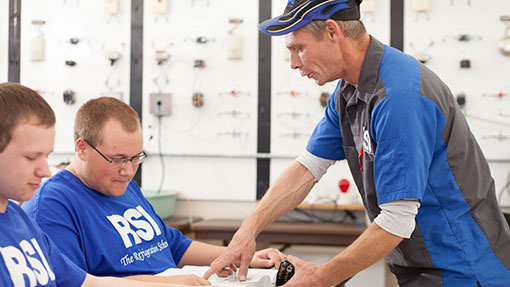Associate of Occupational Studies in Mechanical Maintenance Engineering
Duration: 15 Months
RSI is the right choice
HVAC/R Training Since 1965
94%³
Overall Employment Rate
Across All RSI Campus Locations
Largest HVAC/R School in the USA*
Upcoming Class Start Dates
| Class | Location | Date |
|---|---|---|
| Classes Start | Phoenix, AZ | 05/28/2024 |
| Classes Start | Phoenix, AZ | 07/03/2024 |
Class Schedules
Lower Division Courses
| Morning (M-F) | Afternoon (M-F) | Evening (M-Th) |
|---|---|---|
| 7:30am-12:30pm | 12:45pm-5:45pm | 6:00pm-10:00pm |
Upper Division
| Morning (M-Th) | Afternoon | Evening |
|---|---|---|
| 7:30am-12:30pm | N/A | 5:30pm-10:30pm |
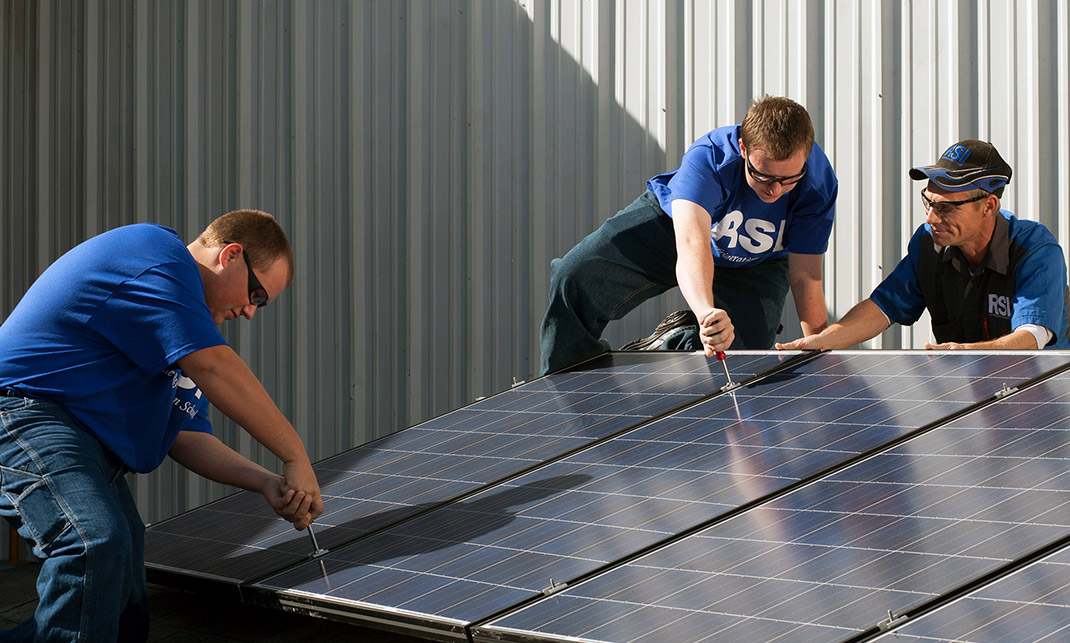
RSI’s 15 month Associate of Occupational Studies in Mechanical Maintenance Engineering Degree program includes the completion of the on-campus Electro-Mechanical Technologies program.
The remaining coursework for the Associate of Occupational Studies in Mechanical Maintenance Engineering Program is available online or on-campus.
What can you do in 15 months?
Mechanical maintenance engineering covers a broad range of potential employment options in heating, ventilation, air conditioning and refrigeration (HVAC/R). Graduates of this program would be great candidates for entry-level jobs that require maintaining and servicing large, complex systems in the HVAC/R industry. Some career options are:
- Facilities Maintenance
- Engineer/Technician
- HVAC/R Service Technician
- HVAC/R Installation Technician
- Refrigeration Service Technician
- Refrigeration Installation Technician
- Low-Temperature Field Technician
- Restaurant & Retail Refrigeration Technician
- Commercial Refrigeration Technician
- Power Plant Field Technician
- Maintenance Electrician
- Boiler Operator
Employment is Expected to Grow for HVAC/R in the US by 40,100 Jobs by 2031`!i
Flexible Class Schedules
Class schedules range from morning, afternoon and evening, depending on the program and campus location. RSI offers flexible schedules whether you are just graduating from high school, changing your career, or transitioning from military to civilian life. We work hard to find the right program and the right schedule to help you succeed. Contact us for more information on upcoming class times and start dates for the AOS in MME program.
Request More Info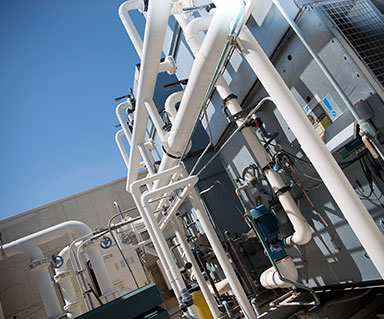
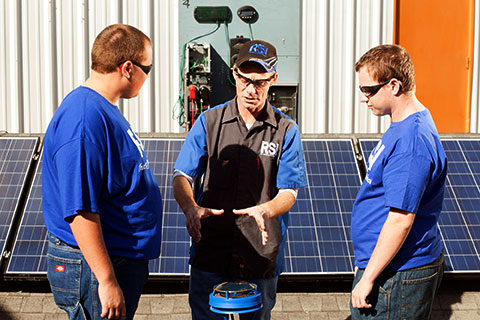
Program Courses
- Prerequisite Courses
- Basic College Mathematics
- English Composition
- Principles and Applications of Air
- Motors and Applications
- Predictive Maintenance and Piping Systems
- Transformers and Technical Math
- Cooling Towers and Maintenance
- Chillers
- Fundamentals of Boilers
- Boilers and Boiler Systems
- Preventative Maintenance and Planning
- Computer Applications and Decision Making
- Entrepreneurship
Prerequisite Courses
This program requires completion of the Electro-Mechanical Technologies program prior to enrolling. Here are the prerequisite courses included in Electro-Mechanical Technologies:
Prerequisite Classes – Electro-Mechanical Technologies Program:
- Fundamentals of Electricity
- Fundamentals of Solar
- Electric Wiring – Residential
- Electric Wiring – Commercial
- Fundamentals of Refrigeration
- Refrigeration Systems and Practices
- Comfort Systems – Residential
- Comfort Systems – Commercial
- Advanced Troubleshooting
Click Here for class descriptions.
Basic College Mathematics
This course presents the fundamental concepts of a pre-algebra course. Students will be introduced to whole numbers, fractions and decimals, integers, order of operations, percents, signed numbers, measurements, geometry, probability, and basic algebra concepts.
BCM100
- 3 Semester Credit Hours
- 45 Lecture Hours
- 45 Total Contact Hours
- 112 Outside Prep Hours
English Composition
This course develops written communication skills with an emphasis on understanding the writing process, analyzing readings, and practicing writing for personal and professional applications.
ENG100
- 2 Semester Credit Hours
- 29.5 Lecture Hours
- 29.5 Total Contact Hours
- 100.5 Outside Prep Hours
Principles and Applications of Air
This course includes the study of typical pneumatic control systems: the evaluation, maintenance, operation and troubleshooting of the air station, controlled devices, controllers, receiver controllers, transmitters, relays and switches which make up a pneumatic control system. An introduction to air compressors which drive a pneumatic system is also discussed also provided are the mathematic concepts similar to those described in Liquid Piping, as applied to the advanced study of the properties of air and heat calculations with the use of a psychrometric chart, along with information, calculations and formulae used in fan operation and analysis, duct work and air distribution, air outlets, air balancing, belt and sheave analysis and air filters.
MME205
- Prerequisite Course(s): All Lower Division Courses
- 2 Semester Credit Hours
- 50 Lecture Hours
- 50 Total Contact Hours
- 12 Outside Prep Hours
Motors and Applications
This course covers the techniques and calculations (including evaluation of expressions, order of operations, symbols of inclusion and power exponents) to determine load and sizing requirements for heating and cooling equipment. Included is the 24 hour method of load calculation and sizing of residential and commercial air conditioning and heating equipment as well as commercial refrigeration equipment. Additionally, the course covers the application of single and three phase motors. Applications include motor types, operation, components, control hookups, motor feeder and branch circuit conductors, motor protection, motor control circuits and motor connections and testing, connections, transformer schematics and auto transformers of low and high voltage systems.
MME210
- Prerequisite Course(s): All Lower Division Courses
- 2 Semester Credit Hours
- 50 Lecture Hours
- 50 Total Contact Hours
- 12 Outside Prep Hours
Predictive Maintenance and Piping Systems
This course covers why and how compressors fail, how to detect the cause of compressor failures and how
to prevent repeat compressor failures. Commercial serviceable hermetic reciprocating compressors are covered, as well as Rotary and Scroll compressor operation and servicing. Also covered are maintenance of reciprocating, rotary and centrifugal air compressors and compressed air systems. This course also covers types of distribution systems, materials and accessories found in water refrigeration systems. Also covered are concepts including evaluation of expressions, order of operations, symbols of inclusion, power exponents, proportions and computation of surface area uses applied to liquid piping operations. Included are: calculations and methods to determine pressure drops and pipe friction in water and refrigeration lines; techniques and methods to calculate the sizes
of suction, discharge and liquid line of single and multiple piping systems in HVAC equipment and water lines; and methods and procedures to size water pumps and calculate pump head.
MME215
- Prerequisite Course(s): All Lower Division Courses
- 2 Semester Credit Hours
- 50 Lecture Hours
- 50 Total Contact Hours
- 12 Outside Prep Hours
Transformers and Technical Math
This course provides students an introduction to transformer concepts and theories used in the building industry and technical mathematics. Topics include: Transformer configurations, cooling, wiring, and order of operations, ratios, exponents, algebraic methods, and solid figures. Students demonstrate their proficiencies via participation, exercises and periodic quizzes and examinations.
MME220
- Prerequisite Course(s): All Lower Division Courses
- 2 Semester Credit Hours
- 50 Lecture Hours
- 50 Total Contact Hours
- 12 Outside Prep Hours
Cooling Towers and Maintenance
This course covers cooling tower history and theory. Included are waste heat disposal, maintenance and inspection of interior and exterior structure, mechanical equipment including fans, gear boxes, power transmission and motor. Also covered are different types of cooling towers, water distribution systems, upgrading of existing cooling towers, water treatment, and water filtration and purification methods. Also covered is the installation, start-up and troubleshooting of 15-200 ton conventional reciprocating liquid chillers. Included are conventional chiller controls, step controllers used in chiller capacity, electronic controls and operation, microprocessor chiller controls, their operation, troubleshooting, and flotronic chiller operation and troubleshooting.
MME225
- Prerequisite Course(s): All Lower Division Courses
- 2 Semester Credit Hours
- 50 Lecture Hours
- 50 Total Contact Hours
- 12 Outside Prep Hours
Chillers
This course covers the differences in components and operation between centrifugal and reciprocating chillers. Included is a study of the centrifugal compressor, its operation, components and troubleshooting. The familiarization, operating sequence, start up, troubleshooting application, and operation of the microprocessor expanded service panel are covered. Finally, central station air handling units with Product Integrated Controls (PIC) operation and troubleshooting is covered. In addition this course covers steam and direct fired absorption systems as well as screw compressor systems. Included are system operation, system components, system controls, control sequences, start up, maintenance, troubleshooting and installation procedures for both types of systems. Also covered is an absorption system.
MME240
- Prerequisite Course(s): All Lower Division Courses
- 2 Semester Credit Hours
- 50 Lecture Hours
- 50 Total Contact Hours
- 12 Outside Prep Hours
Fundamentals of Boilers
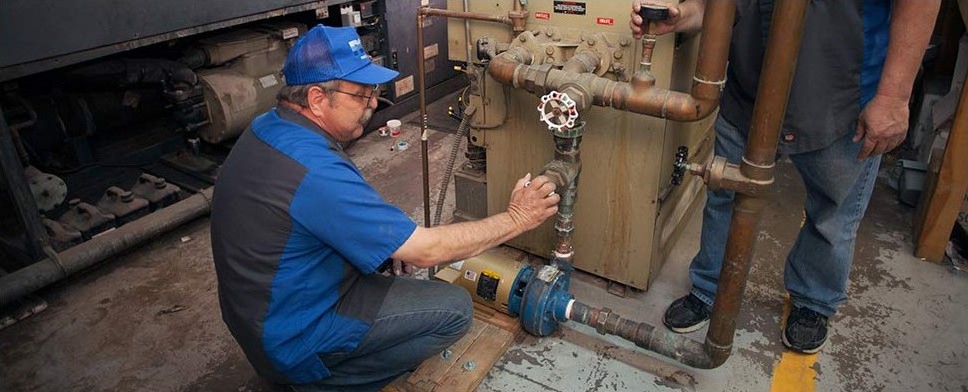
This course covers the principles of low pressure boiler operation. Included are boiler operation, fittings, feedwater accessories, steam and combustion controls, draft control and water heating systems. The principles of high pressure boiler operation. Included are steam boiler types, package and field erected boilers, the steam system, feedwater systems, fuel system, feedwater and fuel heaters, pumps, regulators, traps, superheating, desuperheating, and pressure reducing systems and steam boiler operation.
MME245
- Prerequisite Course(s): All Lower Division Courses
- 2 Semester Credit Hours
- 50 Lecture Hours
- 50 Total Contact Hours
- 12 Outside Prep Hours
Boilers and Boiler Systems
This course covers the techniques and procedures for boiler operation and evaluation. Included are oil fired boiler installation, steam boiler operation, hot water boiler operation and evaluation, boiler start-up, service and troubleshooting, as well as boiler instruments, water treatment and boiler room safety. Also provided are the fundamentals of multiple boiler operation, hydronic systems, the principles of zoning, system sizing and calculations, zone valves, boiler selection, as well as boiler piping, installation and troubleshooting.
MME250
- Prerequisite Course(s): All Lower Division Courses
- 2 Semester Credit Hours
- 50 Lecture Hours
- 50 Total Contact Hours
- 12 Outside Prep Hours
Preventative Maintenance and Planning
This course covers the techniques and procedures for boiler and chiller inspection and maintenance. Included are preventive and predictive maintenance procedures, maintenance of boiler room and heating equipment, fire protection and structure, and maintenance of centrifugal, reciprocating, OPAC, and modular liquid chillers. Included in this course covers the fundamentals and procedures necessary for starting and running a personal business, including topics on writing successful business plans, licensing requirements and information, different types of business organizations, business assets, and business operation.
MME255
- Prerequisite Course(s): All Lower Division Courses
- 2 Semester Credit Hours
- 50 Lecture Hours
- 50 Total Contact Hours
- 12 Outside Prep Hours
Computer Applications and Decision Making
This course covers the fundamentals, components and operations of computers and computer systems. Included is an introduction to computer basics, computer components and operations, hardware configuration and software applications. Also covered are a demonstration and application of miscellaneous software relating to the industry.
This course emphasizes the concept that service is produced and consumed simultaneously and addresses communications and active listening methods to ensure this transaction is profitable and positive. Includes servicing techniques in dealing with customers in a positive manner.
MME260
- Prerequisite Course(s): All Lower Division Courses
- 2 Semester Credit Hours
- 50 Lecture Hours
- 50 Total Contact Hours
- 12 Outside Prep Hours
Entrepreneurship
In this course, students learn academic theory, review case studies, and complete exercises in critical thinking that help student entrepreneurs start-up a small business and related communication skills with an emphasis on professionalism.
MME265
- 2 Semester Credit Hours
- 45 Lecture Hours
- 45 Total Contact Hours
- 9 Outside Prep Hours
Sound Interesting? Contact us for more information on this course and the Mechanical Maintenance Engineering program below.


